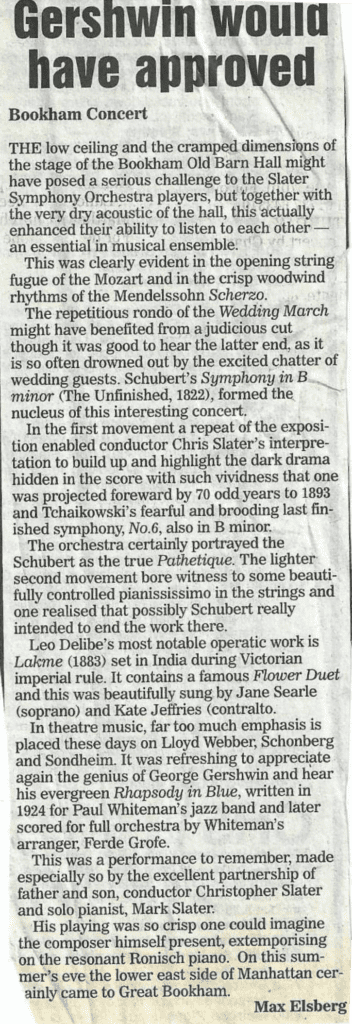Midsummer Concert, Bookham, Surrey
Review by Max Elsberg (Surrey Mirror July 1996)

THE low ceiling and the cramped dimensions of the stage of the Bookham Old Barn Hall might have posed a serious challenge to the Slater Symphony Orchestra players, but together with the very dry acoustic of the hall, this actually enhanced their ability to listen to each other – an essential in musical ensemble.
This was clearly evident in the opening string fugue of the Mozart and in the crisp woodwind rhythms of the Mendelssohn Scherzo.
The repetitious rondo of the Wedding March might have benefited from a judicious cut though it was good to hear the latter end, as it is so often drowned out by the excited chatter of wedding guests. Schubert’s Symphony in B minor (The Unfinished, 1822), formed the nucleus of this interesting concert.
In the first movement a repeat of the exposition enabled conductor Chris Slater’s interpretation to build up and highlight the dark drama hidden in the score with such vividness that one was projected forward by 70 odd years to 1893 and Tchaikowsky’s fearful and brooding last finished symphony, No.6, also in B minor. The orchestra certainly portrayed the Schubert as the true Pathetique. The lighter second movement bore witness to some beautifully controlled pianississimo in the strings and one realised that possibly Schubert really intended to end the work there.
Leo Delibe’s most notable operatic work is Lakme (1883) set in India during Victorian imperial rule. It contains a famous Flower Duet and this was beautifully sung by Jane Searle (soprano) and Kate Jeffries (contralto).
In theatre music, far too much emphasis is placed these days on Lloyd Webber, Schonberg and Sondheim. It was refreshing to appreciate again the genius of George Gershwin and hear his evergreen Rhapsody in Blue, written in 1924 for Paul Whiteman’s jazz band and later scored for full orchestra by Whiteman’s arranger, Ferde Grofe.
This was a performance to remember, made especially so by the excellent partnership of father and son, conductor Christopher Slater and solo pianist Mark Slater.
His playing was so crisp one could imagine the composer himself present, extemporising on the resonant Ronisch piano. On this summer’s eve the lower east side of Manhattan certainly came to Great Bookham.
Max Elsberg
